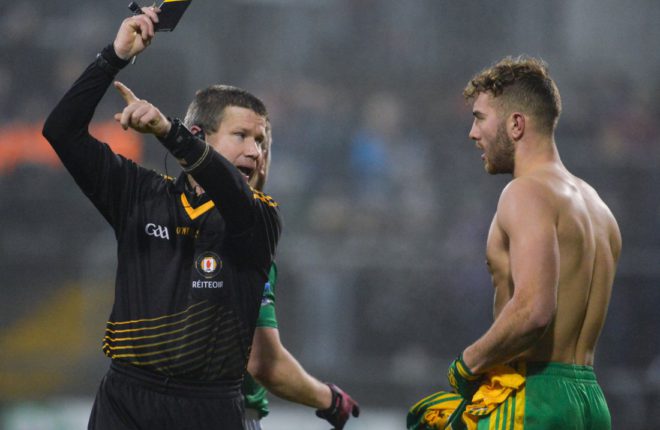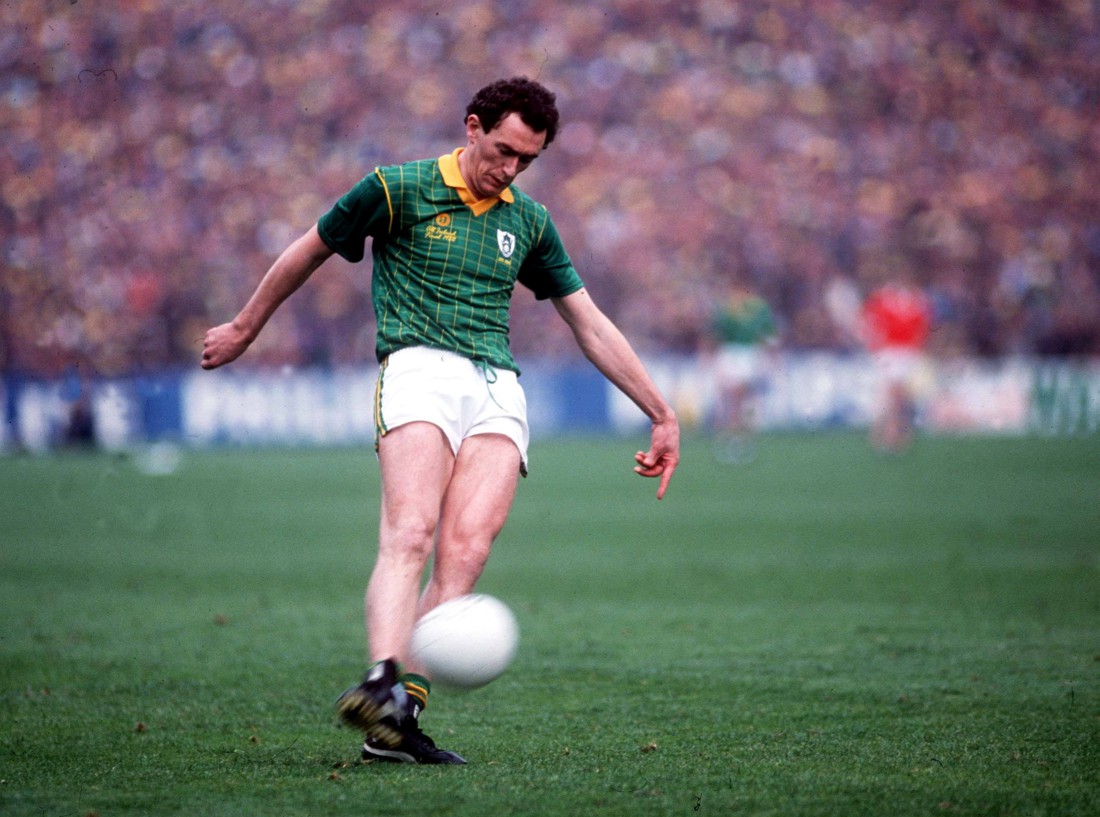WITH all the chat about the latest age structure and fixture proposals, Michael McMullan looks back on the some of the rule changes down the years.
Can you kick it?
FOR fans of a certain vintage, the ‘Kerry Golden Years’ video was a procession of one of the greatest teams to ever play Gaelic football. The only thing that tainted it was the amount of hand passed goals, which looked more like throws such was the speed at which Mick O’Dwyer had them operating at.
By the end of the 1980 season, a new ruling made it illegal to handpass a goal and helped the game’s aesthetics without having any impact on the Kingdom’s progress who came back to secure another three in a row.
A helping hand with frees
WITH the start of the 1990s came the new move to allow frees kicks and sideline balls to be kicked from the hand.
The downside was how is relegated the skill of kicking from the ground, but it allowed the game to increase in pace. No longer was there a debate over who was taking a free and someone coming from the other side of the pitch.
Within a few years forwards, like Peter Canavan in 1995, began to kick scoreable frees from the hands with great effect.
Adding value
IT not a rule change as such, but the 1991 season brought in the sponsor logo on the jersey on the way to the heavily commercialised GAA we now have.
We heard the stories of Kerry players getting free boots and donations to a training fund for posing as part of a washing machine promotion campaign.
There were always benefactors backing the teams they were passionate about, but once the sponsor logo became a viable advertising space, the GAA’s popularity gave companies a new show window. And now, certain counties have more than one sponsor logo on jerseys, leisurewear and all sorts of branding options.
A greater benchmark
BY the turn of the millennium, a motion was passed to increase the number of substitutes from three to five.
It has been a great addition when you take the amount of work put in by everyone on a panel it gives management teams more flexibility on reshaping their team.
Seamus Darby was the most famous super sub with his goal to end Kerry’s five in a row hopes. Noel Lane had a knack of scoring goals for Galway hurlers.
With the faster tempo, the fresh legs are an important part of winning teams. Also, you have the case of Tyrone taking Canavan off and putting him back on in the 2003 final.
A second chance
GALWAY became the first team to win the All-Ireland through the first year of the Qualifiers, 2001, after losing to Roscommon in Connacht.
The Tribesmen regrouped and with the nucleus of their ’98 winning team came back. Matthew Clancy’s goal sunk Derry, turning out to be the pivotal moment in the season.
It gave minnows a chance to build momentum, but in the long run the cream still came to the top with the established counties having the luxury of learning from defeat.
Tee it up
AS the noughties moved on, a new rule change came in allowing goalkeepers to use a tee for their kick-outs with a number of advantages.
It saved pitches with no need for ‘keepers to dig up a divot to help plant their kicking their foot under the ball. With the tee, there wasn’t the same need for the big rugby boots that became the fashion to help ‘keepers kick through the ball for more power.
It reduced the strain on groins with less studs catching on the turf of dry sod of summer.
Perhaps the biggest plus was the help it gave slight ‘keepers in their first year out of u-14, faced by a size five ball and having to kick it off the ground.
Take one for the team
WHEN Conor McManus broke clear of the Tyrone defence in the 2013 championship, goal was the only thing on his mind. That was until Sean Cavanagh unceremoniously pulled him to the ground to prevent a goal scoring chance.
With Joe Brolly leading the charge, a move to eradicate the cynical fouling was born and by 2014 the black card was brought in for such a foul.
It started with being ordered off the pitch, later being diluted to a ten-minute spell in the sin-bin.
In terms of cleaning up the game, it has worked to a certain degree with one major drawback – the consistency with how it is interpreted by some officials.

CARD MARKED…Stephen McMenamin dismissed on a black card by referee Padraig Hughes
Make your mark
AS possession passed football began to take root, pressure was put on the GAA top brass to bring back the art of fielding. A look at any game before the 1990s and it was littered by players like Anthony Tohill, Teddy McCarthy and Darragh Ó Sé who could pluck a high hall for fun.
The playing rules’ body introduced the mark for a player, between both 45’s, to be awarded a ‘mark’ and given a free like they are in the AFL.
Its success is measured on how many tall players a manager has to avail of it, but if a ‘keeper has them it can be a useful avenue to relieve pressure. And bring back the eye-catching skill.
Get me the ballA FOLLOW up to the mark is the advanced mark, allowing a free shot if a ball – kicked from outside the 45 metre line – is caught clean. If it is the high balls like those thumped into David Clifford in this year’s All-Ireland final, an argument can be made for this. But the problem is that a chest catch under no pressure just inside the 45 metre line has the same reward and can allow teams to systematically slow the game down with no skill involved.
Age group change
This is the real head scratcher. The GAA, with very little consultation with enough key stakeholders, wiped out the last year of underage development by making the ‘minor’ grade a year younger at u-17. On the face of it, adult fixtures are no longer affected by county minors being rested. But, in looking after the minority, it has robbed the underdeveloped underage player of a tangible season of action – with his peers – before senior level.
Receive quality journalism wherever you are, on any device. Keep up to date from the comfort of your own home with a digital subscription.
Any time | Any place | Anywhere












